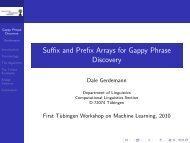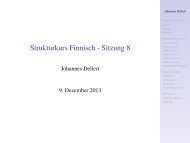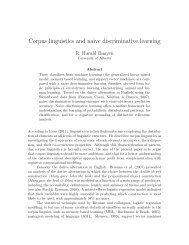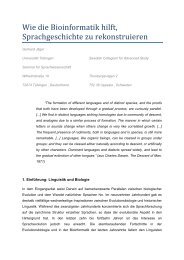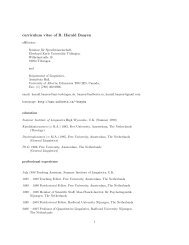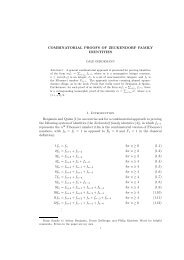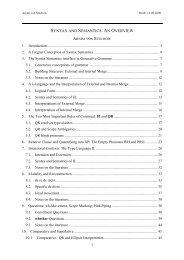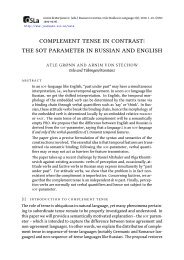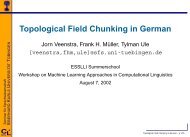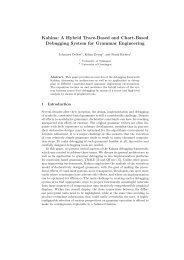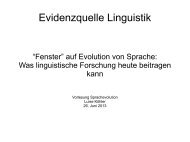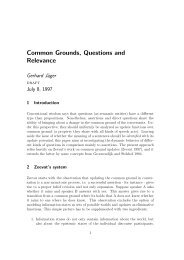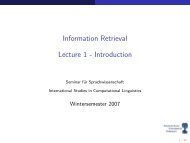A Treebank-based Investigation of IPP-triggering Verbs in Dutch
A Treebank-based Investigation of IPP-triggering Verbs in Dutch
A Treebank-based Investigation of IPP-triggering Verbs in Dutch
You also want an ePaper? Increase the reach of your titles
YUMPU automatically turns print PDFs into web optimized ePapers that Google loves.
Checkpo<strong>in</strong>t Instances Google PT Our system<br />
Noun 4790 0.313 72 0.351 29 0.418 57<br />
Verb 953 0.211 94 0.307 69 0.283 65<br />
Det_Adj_N 278 0.379 28 0.445 72 0.480 17<br />
Dass_Pron_Verb 20 0.375 37 0.383 56 0.383 56<br />
Verb_Pron_DetNoun 17 0.224 97 0.244 09 0.409 45<br />
Weil_Pron_Verb 10 0.236 26 0.311 11 0.577 78<br />
Pass 7 0.134 50 0 1<br />
Table 2: Evaluation results for German-French<br />
5 Evaluation Experiments<br />
In this experiment, we compare our <strong>in</strong>-house SMT system with 2 other systems,<br />
Google Translate 8 and Personal Translator (PT) 9 , <strong>in</strong> terms <strong>of</strong> handl<strong>in</strong>g specific<br />
l<strong>in</strong>guistic checkpo<strong>in</strong>ts. Our SMT system was tra<strong>in</strong>ed accord<strong>in</strong>g to the <strong>in</strong>structions<br />
for build<strong>in</strong>g a basel<strong>in</strong>e system at WMT 2011 10 , with the difference that we use<br />
MGIZA++ [4] for comput<strong>in</strong>g the alignments. As tra<strong>in</strong><strong>in</strong>g data we use Alp<strong>in</strong>e texts<br />
from the Text+Berg corpus (approx. 200000 sentence pairs German-French).<br />
The test corpus comprises 1000 sentence pairs from our Alp<strong>in</strong>e treebank. For<br />
all systems, we use the manually-checked alignments extracted from the treebank.<br />
The comparison will be <strong>based</strong> on checkpo<strong>in</strong>ts which we considered particularly<br />
<strong>in</strong>terest<strong>in</strong>g for each translation direction, most <strong>of</strong> them PoS-<strong>based</strong>.<br />
Table 2 conta<strong>in</strong>s the evaluation results for the language pair German-French.<br />
We have <strong>in</strong>vestigated the follow<strong>in</strong>g checkpo<strong>in</strong>ts: nouns, f<strong>in</strong>ite verbs, noun phrases<br />
consist<strong>in</strong>g <strong>of</strong> a determ<strong>in</strong>er, an adjective and a noun (Det_Adj_N), subord<strong>in</strong>ate<br />
clauses <strong>in</strong>troduced by dass (EN: that) and weil (EN: because) and verb-subjectobject<br />
collocations (Verb_Pron_DetNoun). Additionally, we have also considered<br />
the ambiguous word Pass (EN: passport, mounta<strong>in</strong> pass, amble).<br />
One notices that Personal Translator usually performs better than Google, probably<br />
because, be<strong>in</strong>g a rule-<strong>based</strong> system, it is aware <strong>of</strong> grammatical constructions<br />
and knows how to handle them properly. Its weaknesses are mostly related to the<br />
choice <strong>of</strong> words and unknown words, respectively. S<strong>in</strong>ce we are now look<strong>in</strong>g at<br />
particular grammatical structures, it is likely for a rule-<strong>based</strong> system to analyze<br />
them adequately. Another evidence for this claim is the fact that Personal Translator<br />
outperforms all the other systems with respect to f<strong>in</strong>ite verbs, which pose<br />
difficulties <strong>in</strong> German (e. g. separable verbs).<br />
Our <strong>in</strong>-house MT system performs <strong>in</strong> all cases better than its opponents because<br />
it has been tra<strong>in</strong>ed with texts from the same doma<strong>in</strong>. It thus ga<strong>in</strong>s strongly<br />
<strong>in</strong> vocabulary coverage. The most strik<strong>in</strong>g example is the German word Pass (EN:<br />
8 http://translate.google.com<br />
9 http://www.l<strong>in</strong>guatec.net/products/tr/pt<br />
10 http://www.statmt.org/wmt11/basel<strong>in</strong>e.html<br />
152



